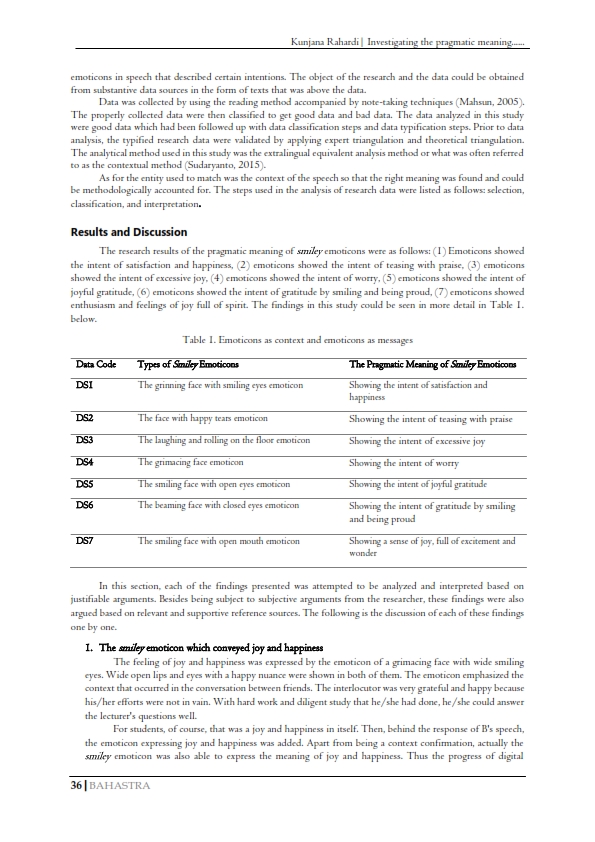Investigating the pragmatic meaning of the smiley emoticon on Whatsapp groups: a cyberpragmatics perspective
DOI:
https://doi.org/10.26555/bs.v42i1.67Keywords:
Emoticons, Pragmatic meanings, Cyberpragmatics, Virtual contextAbstract
This study aims to describe the pragmatic meanings contained in smiley emoticons in cyberpragmatics research. Sources of data were social media, especially from Whattsup taken in a certain period around the time of this research. The source of substantive data was the excerpts of speech in which there were certain expressive meanings that were emotive in nature. The object of this research was the pragmatic meaning of emoticons in speech. The data of this research were emoticons in speech that describe a specific purpose. The data were collected by using the reading method and note taking technique. The data were followed up with a data classification step and a data typification step. Prior to analysis, the data were validated by applying expert triangulation and theory triangulation. The analytical method used was the extralingual equivalent analysis method. The steps used in the analysis of research data were described as follows: selection, classification, and interpretation. The results of the research were presented as follows: (1) Emoticons show the intention of satisfaction and happiness, (2) Emoticons show the intention to tease with praise, (3) Emoticons show the intention of being overly excited, (4) Emoticons show the intention of worrying, (5) Emoticons show the meaning of gratitude is full of joy, (6) Emoticons show the intention of gratitude with a smile and pride, (7) Emoticons show enthusiasm and a feeling of joyful joy.
References
Andrea, B., & Ágnes, V. (2019). Politeness and insult in computer games – from a pragmatic point of view. Magyar Nyelvor.
Bourgeois, P., & Hess, U. (2008). The impact of social context on mimicry. Biological Psychology. https://doi.org/10.1016/j.biopsycho.2007.11.008
Haider, I. (2019). Cyberpragmatics. In Global Perspectives on Language Assessment. https://doi.org/10.4324/9780429437922-11
Halliday, M. A. K. (1975). Learning how to mean : explorations in the development of language. In Explorations in language study. https://doi.org/10.1016/B978-0-12-443701-2.50025-1
Helliwell, J. F., & Putnam, R. D. (2004). The social context of well-being. Philosophical Transactions of the Royal Society B: Biological Sciences. https://doi.org/10.1098/rstb.2004.1522
Kunjana Rahardi, R. (2020). Building critical awareness of corona virus-related news: Cyber-pragmatic study of COVID-19 hoaxes on social media. International Journal of Advanced Science and Technology.
Locher, M. A. (2013). Cyberpragmatics: Internet-Mediated Communication in Context. Journal of Pragmatics. https://doi.org/10.1016/j.pragma.2012.12.002
Locher, M. A., & Graham, S. L. (2010). Introduction to interpersonal pragmatics. In Interpersonal Pragmatics. https://doi.org/10.1515/9783110214338.0.1
Mahsun, M. (2005). Metode Penelitian Bahasa. Jakarta: PT Raja Grafindo Persada. https://doi.org/10.1200/JCO.2008.17.1991
Orsini-Jones, M. E., Lloyd, E., Cribb, M., Lee, F., Bescond, G., Ennagadi, A., & García, B. I. (2019). The Trouble With Cyberpragmatics. In Multicultural Instructional Design. https://doi.org/10.4018/978-1-5225-9279-2.ch053
Page, R. (2014). Saying “sorry”: Corporate apologies posted on Twitter. Journal of Pragmatics. https://doi.org/10.1016/j.pragma.2013.12.003
Rahardi, K. (2016). Personal and Communal Assumptions to Determine Pragmatic Meanings of Phatic Functions. Lingua Cultura, 10(2), 95. https://doi.org/10.21512/lc.v10i2.897
Rahardi, K. (2020). Pragmatik: Konteks Ekstralinguistik dalam Perspektif Cyberpragmatics. Penerbit Amara Books.
Rahardi, R. (2020). Cultural Contexts as Determinants of Speaker’s Meaning in Culture-Specific Pragmatics. https://doi.org/10.4108/eai.12-10-2019.2292181
Rahardi, R. K. (2020). Triadic Functions Of Situational Context Of Hate Speeches : a Cyberpragmatic Perspective. Metalingua.
Rahardi, R. K. (2018). Elemen dan Fungsi Konteks Sosial, Sosietal, dan Situasional dalam Menentukan Makna Pragmatik Kefatisan Berbahasa. Prosiding Seminar Tahunan Linguistik Universitas Pendidikan Indonesia (SETALI 2018), 654–658.
Sudaryanto. (2015). Metode dan Aneka Teknik Analisis Bahasa: Pengantar Penelitian Wahana Kebudayaan secara Linguistis (1st ed.). Sanata Dharma University Press.
Yus, F. (2012). Cyberpragmatics. In The Encyclopedia of Applied Linguistics. https://doi.org/10.1002/9781405198431.wbeal0309
Yus, F. (2016). Towards a Cyberpragmatics of Mobile Instant Messaging. https://doi.org/10.1007/978-3-319-41733-2_2

Downloads
Published
Issue
Section
License
Copyright (c) 2022 R. Kunjana Rahardi

This work is licensed under a Creative Commons Attribution-ShareAlike 4.0 International License.

1.jpg)






